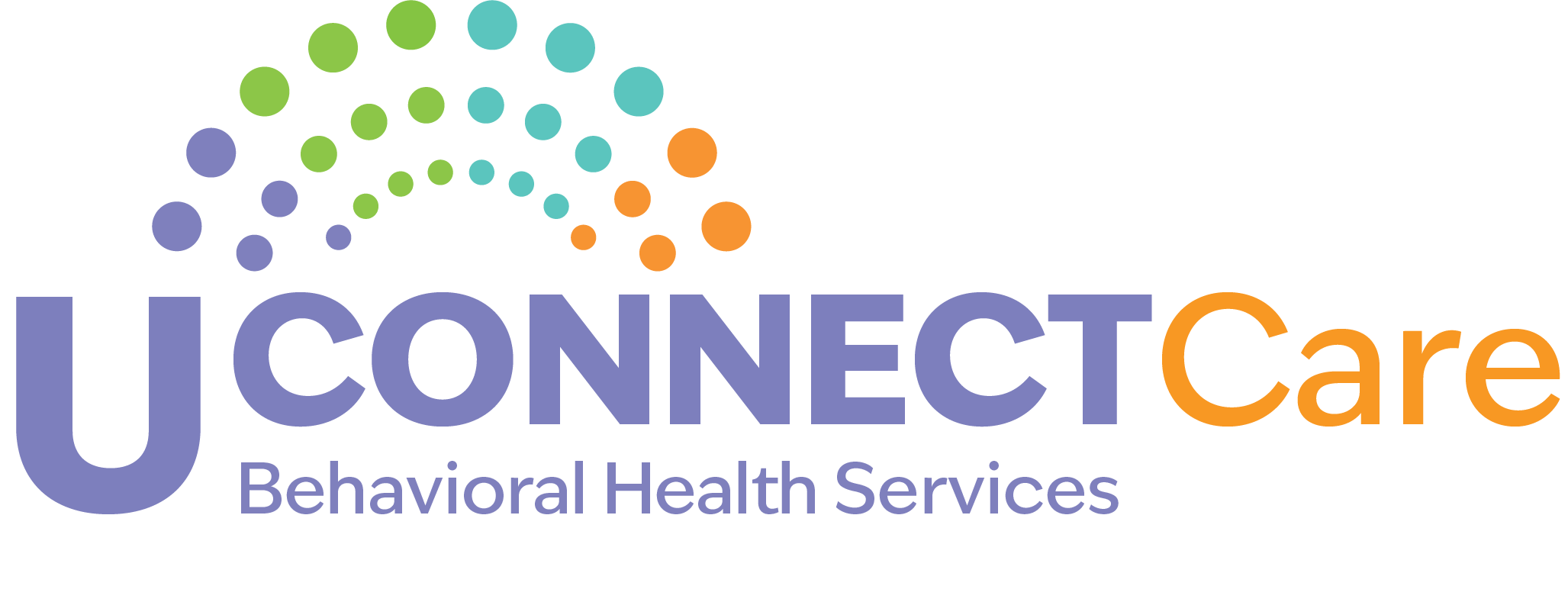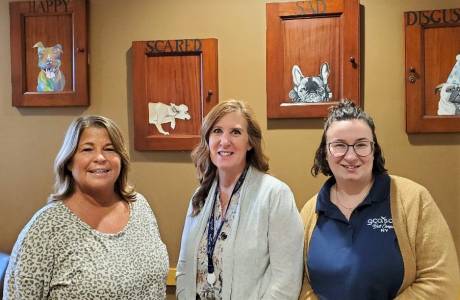By Mike Pettinella
By integrating the opioid treatment program and outpatient counseling clinic, Genesee/Orleans Council on Alcoholism and Substance Abuse has connected the care warranted in a society dealing with the effects of a global pandemic and the stress caused by economic uncertainty.
“Here at UConnectCare and, hopefully, at other agencies in the behavioral health field, we take a person-centered approach, and medication and treatment go hand-in-hand,” said Kathy Hodgins, chief clinical officer at the nonprofit agency based on East Main Street in Batavia. The medication prescribed to a person struggling with substance abuse disorder, whether it be suboxone or methadone, is going to help with the physical symptoms, Hodgins said, while counseling with UConnectCare trained clinicians is important in unlocking changes in behavior.
“It’s the same with a medical condition, such as diabetes and heart disease. You can give a medication to lower blood pressure, but it’s not going to be as effective if you do not have a change in lifestyle to go along with it,” she added. “We give them the tools, not just medication, to learn how to cope with anxiety, depression and trauma without using illicit drugs.”
The OTP (or methadone) clinic attached to the back of the main building opened in the fall of 2018 as a “standalone” clinic. Hodgins said UConnectCare recently applied for – and received – a license to integrate the OTP clinic with the outpatient clinic.
“Until now, individuals receiving treatment at the OTP clinic could only participate in services offered through the OTP clinic. This really limited treatment options for individuals in the OTP,” she said.
STAFFING FLEXIBILITY IS PARAMOUNT
With the integration, UConnectCare has been able to optimize the utilization of its medical professionals and counselors, she said.
“This really allows our counselors to help our patients at the OTP and outpatient clinic by providing a more person-centered approach to care – regardless of whether the individual is on suboxone or methadone. Patients can now attend groups and individual sessions that fit their individual recovery plan and needs,” she explained.
Shannon Murphy, director of Treatment at the Batavia clinic, said the integration has additionally resulted in scheduling flexibility for the staff, something of utmost importance in light that about 10 full-time counselors are providing services to around 240 patients in OTP and another 220 or so in the outpatient clinic.
The demand for services has gone up considerably in the past two years, she said, referring to the impact the COVID-19 pandemic has had on those at risk of a reoccurrence as well as other societal factors.
Along with substance use disorder counselors, UConnectCare’s Batavia clinic also employs a medical director, assistant director, clinical supervisors, two nurse practitioners, five full-time nurses and a physician’s assistant.
FENTANYL: A GAME-CHANGER
Having the proper number of medical personnel on staff has taken on added significance with the emergence of the deadly drug fentanyl, Murphy said.
“Fentanyl has dramatically changed our work as people are sicker now than ever before,” she offered. “Treatment methods that used to help people – prior to the opioid epidemic are just not enough anymore. Medication Assisted Treatment has become a vital part of the services we offer.
“Before we can start to help someone heal from an opioid use disorder, people need to physically feel better. Fentanyl has made this more challenging due to how harmful it is and how prevalent it has become.”
Murphy said that five or six years ago, individuals would test positive for heroin, for example, and they would be shocked when they learned they also had fentanyl in their system.
“At that time, they were scared. Now, they come in and they’re positive for fentanyl only and they are not afraid of it because they don’t think they will be the next to overdose,” she said. “Similar to when we drive too fast or check a text on our phone while driving. We don’t think getting hurt will happen to us, until it does.”
Allison Parry-Gurak, director of Residential Services, said tests are showing that fentanyl is present in many illicit substances, not just heroin.
“For example, we have individuals with a stimulant use disorder whose primary substance is cocaine. More and more frequently, we are finding when we test them they are also positive for fentanyl but they have no history with opioids.” she said.
The scariest part of the fentanyl epidemic is the frequency of overdose.
“We’ve gotten phone calls from agencies in Rochester and reporting they’ve had six overdoses,” Murphy said. “The hardest part is that the people we see that are having fatal overdoses are patients who have gone long periods without use. And then for various reasons or circumstance they have a reoccurrence, sometimes only one time, and those are the people that are dying because their bodies aren’t used to the fentanyl.”
A CONTINUUM OF CARE
Parry-Gurak oversees the Atwater Community Residence, as well as several other residential programs offered by UConnectCare. She said the agency’s ability to expand services over the years gives patients a greater chance in their recovery.
“Well, I think the beauty of this campus is that we pretty much offer the whole continuum of care all on one campus. Additionally, all of our programs have such great working relationships with each other and are able to work collaboratively to support our patients,” she said.
“So, there’s the residences plus now we have the detox center for those in need of medical supervision while they start their recovery journey (usually three to seven days), and then there is the outpatient treatment programs all in one place.”
Hodgins mentioned that the system is working.
“Having a campus like this where we can do the continuum of care is a great thing,” she said. “People will come to detox and then transition to Atwater, and/or walk over to the clinic for their treatment.”
UConnectCare also offers The Recovery Station, a drug- and alcohol-free social setting at the former Bohn’s Restaurant building on Clinton Street Road, and a shuttle service for those in need of transportation.
For Hodgins and Murphy, both longtime employees at UConnectCare, integration, effective medications and counseling, and expansion of services provide opportunities for people with a substance use disorder to live healthy lives.
TIME TO WITHHOLD JUDGMENT
All three women also mentioned the need to eliminate the stigma associated with substance use disorder.
“We deal with a disease that is encompassed in shame, guilt and hurt,” Parry-Gurak said. “A lot of times, people that are pointing the finger saying to us, ‘What are you doing? You’re not helping them? Or you’re just giving them more ‘drugs’ are either someone who has been hurt by someone with a substance use disorder or someone who truly does not understand how difficult and complex this disease is.”
Murphy acknowledged that substance use disorder is “an ugly disease, and the behaviors that can be associated with it are not pretty.”
“Therefore, the stigma associated with substance use disorder is so strong in our society and this creates an additional obstacle for those with a substance use disorder,” she added.
When asked how she measures success, Hodgins said the word has different meanings for different people.
“It’s really hard to define,” she responded. “People ask me all the time, what’s your success rate? It’s very hard to define because it’s all individualized.”
Hodgins, Murphy and Parry-Gurak said they know that many area residents are in need of substance use services and that UConnectCare has an open access policy where walk-ins are accepted.
Murphy said all prospective patients are assessed to see what treatment is appropriate,
“It’s about having a conversation. With methadone, it’s a little different because things need to be done before they’re actually admitted,” Murphy said. “There’s a very specific process but it all starts with a phone call to our main number, 343-1124.”
For more information about UConnectCare’s treatment programs, call 585-343-1124 or visit uconnectcare.org. Walk-in assessments, with no appointment necessary, are done on Tuesday through Thursday prior to 11:15 a.m.

